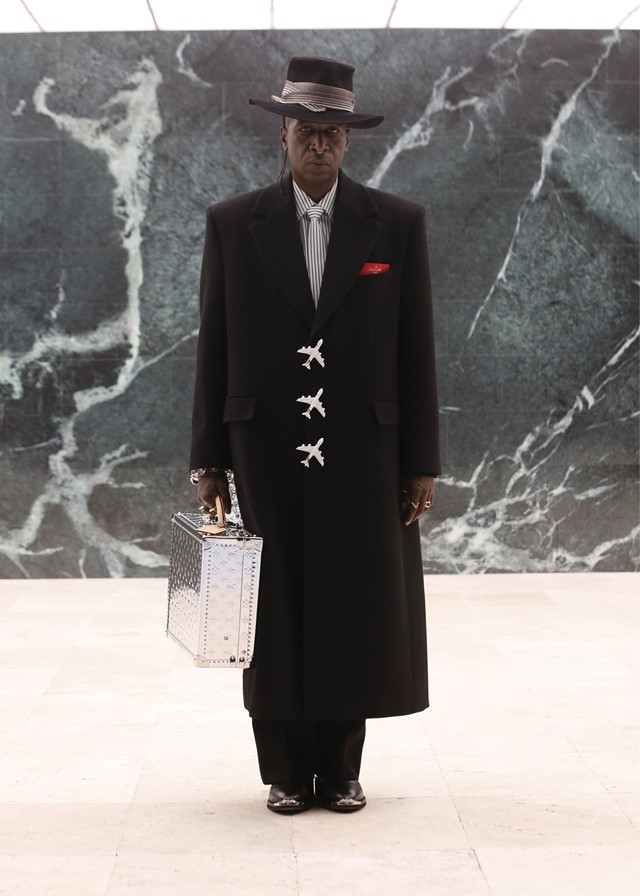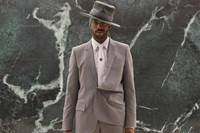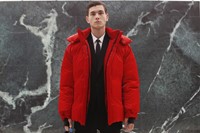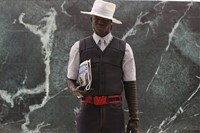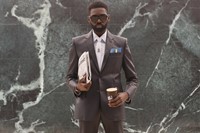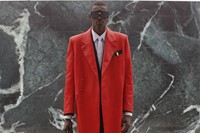The designer reveals his Autumn/Winter 2020 offering via a Wu Tsang-directed short film, featuring performances by yasiin bey (Mos Def) and Saul Williams
“What do you want to be when you grow up?” began the extensive show notes which accompanied Virgil Abloh’s latest collection for Louis Vuitton, revealed yesterday via a short film shown on Paris Fashion Week’s digital platform. “As children, our dreams and aspirations are personified by archetypes: the artist, the salesman, the architect, the drifter,” they continued, setting the stage for a collection which mused on – and challenged – the archetypes we construct about the way a person dresses, “the unconscious biases instilled in our collective psyche by the archaic norms of society”.
The film itself used James Baldwin’s 1953 essay Stranger in the Village as its starting point, an essay which draws parallels between the author’s experience as an African-American man living in isolated Swiss village Leukerbad as the only person of colour, and his life as a Black citizen of the United States. Directed by Wu Tsang alongside creative director Josh Johnson, the film moves between scenes filmed in the Swiss mountains and Paris to capture “the experience of being recognised and gazed upon as different, illegible” and what Abloh calls the “tourist v purist” logic behind the entire collection – “society’s established structure of outsiders versus insiders.”
The scenes in Paris take place in an airport-like marble set, whereby an abstract rendering of an art heist is taking place – a figurative metaphor for the “myths spun by society around origin and ownership of art, visual references and those who create”. Powerfully soundtracked by London-based poet and performer Kai-Isaiah Jamal – “I think as Black people, and as trans people, and as marginalised people, the world is here for our taking – for it takes so much from us,” they say in a voiceover, as well as appearing in the show itself as the first Black trans model to walk for Louis Vuitton – and performances by yasiin bey (Mos Def) and Saul Williams, the film brings together a raft of other collaborators to foreground a collection which was Abloh’s most expressive yet.
Playfully riffing on the idea of archetypes, Abloh melded recognisable elements of menswear – the cowboy hat, pinstripe tailoring, kilts, military and varsity jackets, the trench coat – into amalgamated looks which Abloh described as “neo-types”, people unable to be defined by the narrow boundaries which society has predetermined. Styled by Dazed’s newly appointed editor-in-chief Ib Kamara, these idiosyncratic looks – which often spoke of travel, with an aeroplane motif running throughout, including as a Vuitton-monogrammed handbag – spoke to a desire for a new conception of normal, one no longer “associated with the genetic makeup of certain human beings” and free of prejudice and ownership.
The use of Ghanaian Kente fabric, here imagined in tartan, seemed to best encapsulate the collection’s complex aims. “If Kente cloth – the fabric of Virgil Abloh’s cultural heritage – is rendered in tartan, does that make Kente any less Ghanaian and tartan any less Scottish?” said the notes. “Provenance is reality, while ownership is myth: man-made inventions now ripe for reinvention.”
